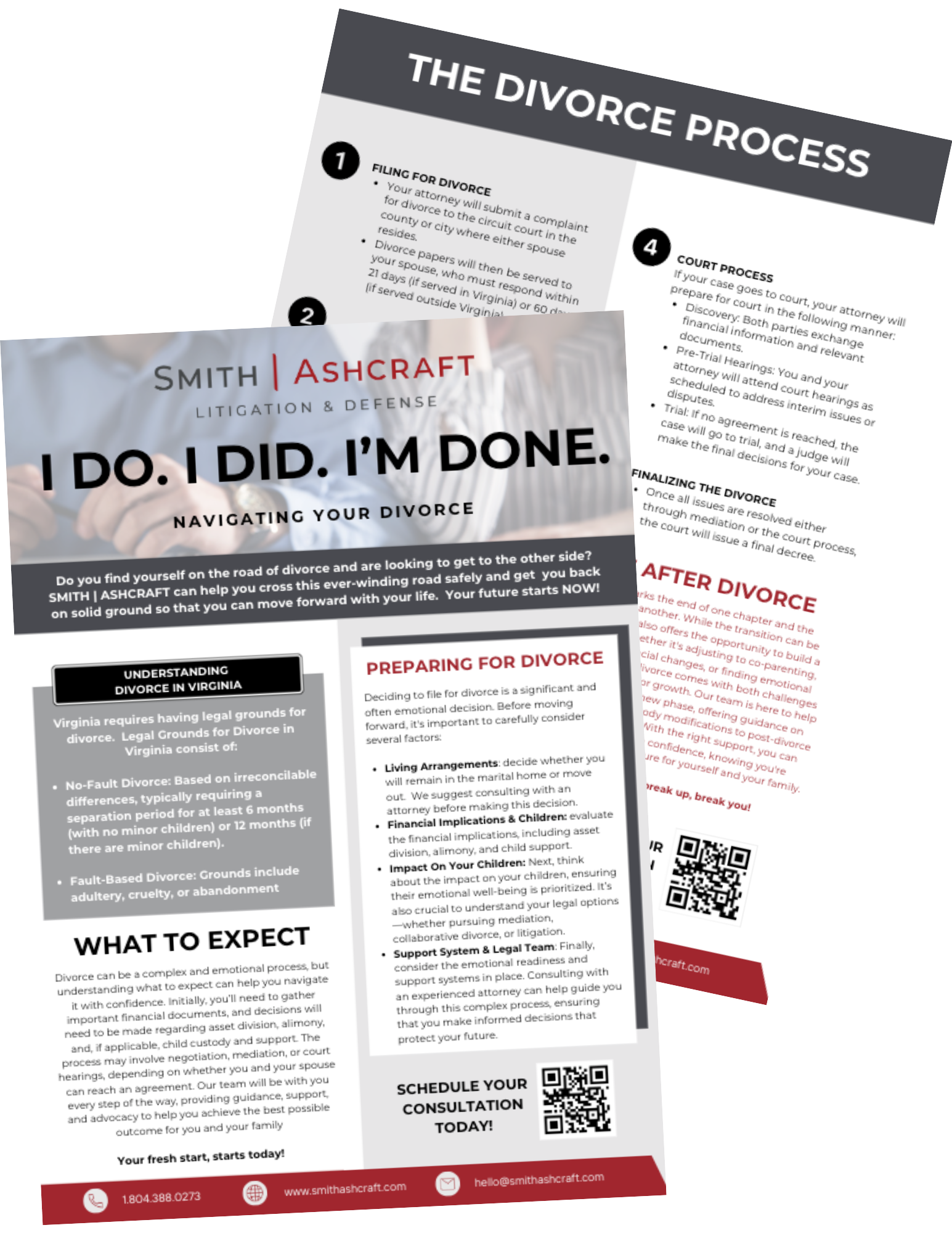Military Divorce
To our military service members, we thank you for your dedication and sacrifice!
If you are going through a divorce, let SMITH | ASHCRAFT guide you through the divorce process. Click "Get Started" or fill out our quick form below and our team will reach out to you to discuss your divorce and how we can tailor a strategy specific to your needs. We are experienced in helping military families navigate the complexities of divorce and custody issues.
Understanding
Military Divorce & Issues
Because divorce creates two households, each with its own set of expenses, there is often a need for one spouse to receive spousal support, sometimes called alimony. The primary reason for a court to award spousal support is to help ensure that both parties continue to live a similar standard of living to the standard they enjoyed during the marriage.
Courts are empowered to award spousal support on a temporary and final basis. Temporary spousal support can be awarded while the divorce suit is ongoing. Depending on the combined income of the parties, the Court may use a
formula. The purpose of a temporary spousal support order is to help maintain the status quo for both parties until a final determination has been made.
When a Court makes a final determination of spousal support, it is typically awarded via alump sum, monthly payments over a set period of time, or it can be indefinite. The amount and duration of spousal support depends on 13 factors that the Court is required to consider. The full list can be found
here,
but some of the main considerations include:
- The incomes and earning ability of each party;
- The needs of each party;
- The standard of living during the marriage;
- Financial contributions to the family during the marriage;
- Non-financial contributions to the family during the marriage;
- Age and mental and physical health of each spouse;
- How the property and debt was divided;
- The length of the marriage; and
- Whether one party is at fault for the dissolution of the marriage (adultery).
Unlike child support, spousal support is not determined by a formula. As there are many factors that go into how much and how long spousal support should be paid, it’s important to consult with an attorney to discuss your specific situation.
Incomes of Parties - What’s Included
In determining spousal support, the parties, attorneys, and judges need to know what each party’s gross income is. In Virginia, this consists of any income from wages, dividends, rentals, retirement, interest, or other court-ordered support. Providing your attorney with documentation of all sources of income is vital for a fair accurate decision regarding spousal support.
There may be situations in which income can be imputed to a spouse as well. Imputed income is income that a spouse should be able to make, even if they currently do not make it. This often becomes an issue when one spouse voluntarily changes employment to make less money to avoid paying support. If this sounds like your case, please contact Smith Ashcraft to discuss how it may impact your divorce.
Standard of Living/Expenses
In Virginia, the Court will consider the standard of living during the marriage. Both parties will present monthly income and expense sheets to show the Court their financial situations. Your standard of living can include the size of house you had during the marriage, the type of vehicles you drove, your vacationing habits, how much you spent on groceries or entertainment, what kind of retirement contributions you made, and so forth. Keeping accurate monthly budgets will help you make your case for or against spousal support.
Fault
One of the statutory factors Virginia Courts must consider in awarding spousal support is fault. These include the fault-based grounds for divorce of abandonment, abuse, and adultery. Specifically, a finding of adultery can stop a spouse from receiving spousal support. The only way that a cheating spouse would be awarded spousal support would be if not awarding support would result in a “manifest injustice.”
Duration and Modification
The length of time that spousal support lasts depends on a number of factors. There is no hard and fast rule as to how long spousal support lasts, but as a general rule of thumb, the longer the marriage, the longer spousal support will last.
Unless you specifically agree that spousal support is not modifiable, either party can seek to modify or terminate spousal support. To modify spousal support, you have to prove that there has been a material change in circumstances that has taken place since spousal support was agreed to or awarded by the Court. This is usually due to an involuntary change in income or one party retires. Modifying spousal support usually requires filing a motion to amend with the Court and having a hearing.
Spousal support is often terminated by the death of either party, the remarriage of the party receiving spousal support, or the cohabitation with a romantic partner for over a year.
Spousal support, also known as alimony, can play a critical role in ensuring financial stability after a divorce. Whether you are seeking support or facing an obligation to pay, understanding your rights and obligations is essential to achieving a fair outcome.
At SMITH | ASHCRAFT, we have extensive experience handling spousal support cases. We’ll carefully evaluate your situation, advocate for your best interests, and work to ensure that support arrangements are fair, reasonable, and aligned with your financial needs or capabilities.
Let us help you navigate the complexities of spousal support—contact us today to get started.
Everything You Need to Understand to
Better Navigate Your Divorce
At SMITH | ASHCRAFT we are here to get you through this chapter of your life.
Your future starts NOW!
Grounds for Divorce
In Virginia, grounds for divorce or separation can be categorized into two main types: fault and no-fault grounds.
Learn more about what type of divorce would best represent your situation.
Separation
In Virginia, there is no “legal separation” like other states have. When we talk about separation, we are talking about when one spouse intended to no longer be married. Learn more about the important points you should consider in a seperation.
Property Division
One of the most complicated issues in divorce is the division of property. This includes the division of debt as well. Lawyers and judges call this equitable distribution. This means that property and debts are not necessarily divided equally. Rather, it will be done “equitably.” Learn more about how your property and assets may be divided in a divorce.
Spousal Support
Because divorce creates two households, each with its own set of expenses, there is often a need for one spouse to receive spousal support, sometimes called alimony. The primary reason for a court to award spousal support is to help ensure that both parties continue to live a similar standard of living to the standard they enjoyed during the marriage. Learn more about the factors that contribute to determining spousal support and how this may impact your case.
Name Change
An adult may legally change his or her name in Virginia. This can be done as part of a divorce or in a separate filing.
Learn more about name changes and how we can help you in this process.
Prenuptial and Postnuptial Agreements
Prenuptial and postnuptial agreements directly impact your rights and obligations in the event of a divorce. Learn more about the complexity of these agreements and how they impact your case.
Helpful Articles
What Our Clients Have To Say
There's no where in Virginia that we don’t know
At SMITH | ASHCRAFT, we are proud to offer comprehensive legal services throughout Virginia. Whether you’re in Richmond, Northern Virginia, the far reaches of Roanoke, or any other part of the state, our experienced team is here to provide experienced representation tailored to your unique needs. No matter where you are in Virginia, we’re committed to delivering the same high level of service and dedication to each client, ensuring your case receives the attention it deserves.









